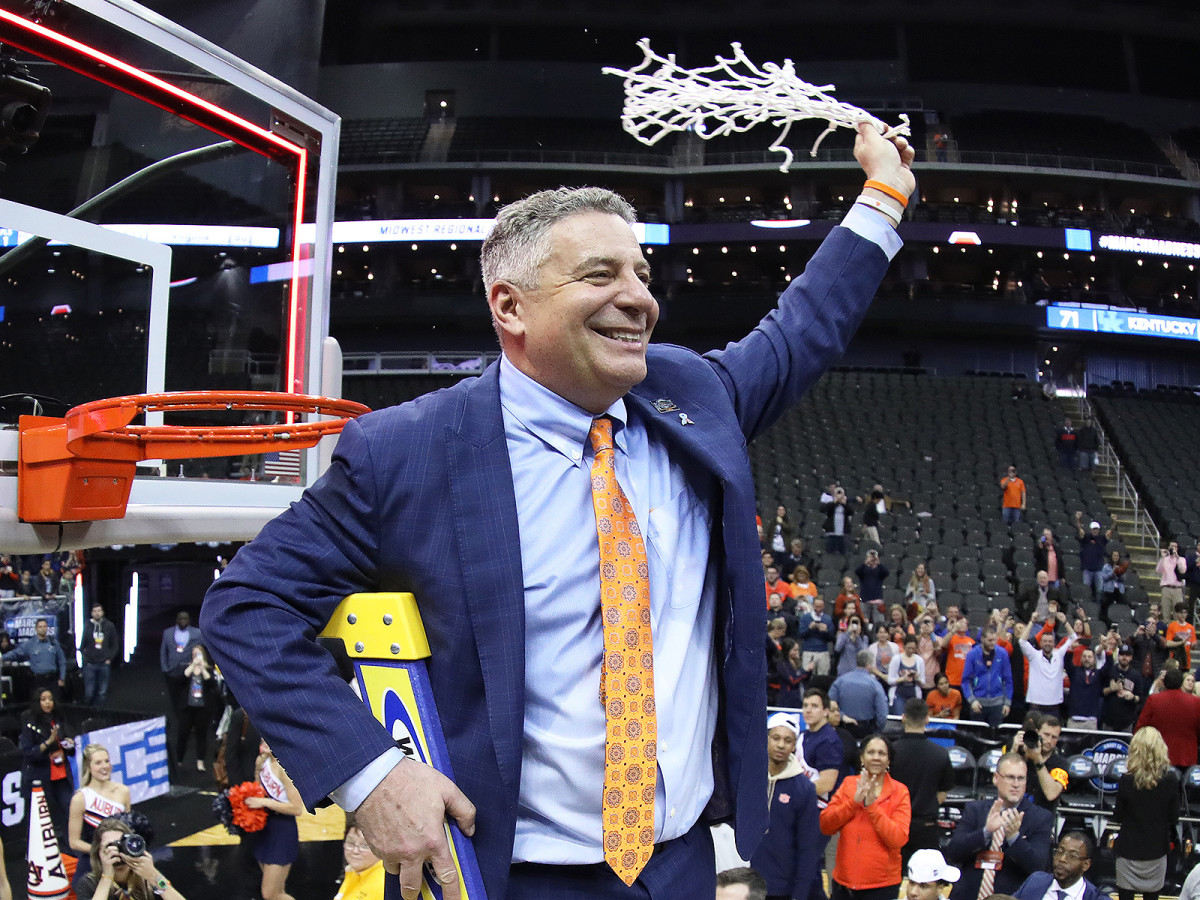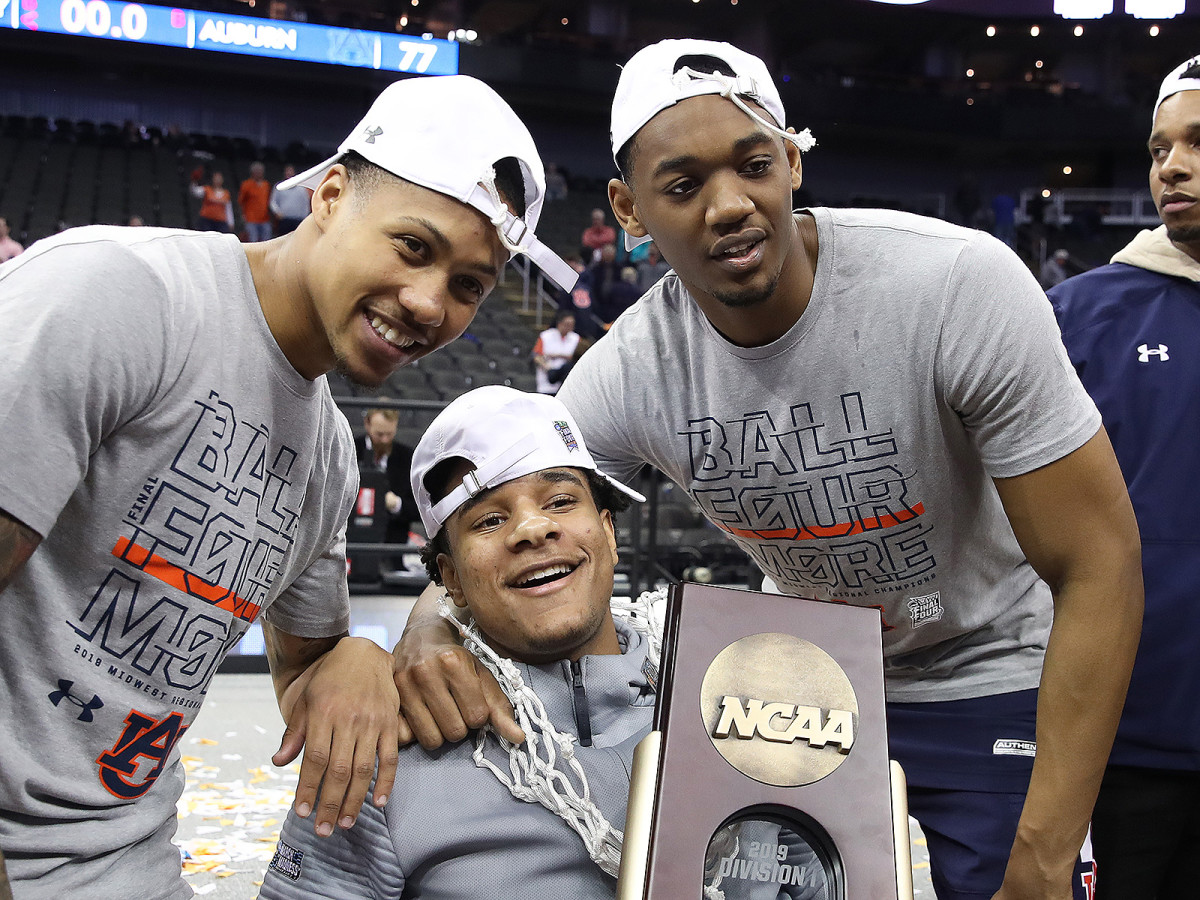Bruce Pearl's Auburn Vision Is Realized and More With Tigers' First-Ever Final Four

KANSAS CITY — Theirs was a path to history. Go on, look ahead, their coach said, defying every tired athletic maxim about singular and immediate focus. When this year’s NCAA tournament bracket was revealed, Bruce Pearl wanted his Auburn players to see what opportunity lay before them: possible matchups against Kansas, North Carolina and Kentucky. Only the three winningest programs in the history of their sport separated the Tigers from reaching their school’s first Final Four. What could be better?
Two days later Pearl stood on hardwood strewn with orange and white confetti, perspiration blotching the shoulders of his blue plaid suit. That history had been made, Auburn on its way to the season’s final weekend and the last of those three traditional beasts now slain. The Tigers had done it with a pair of guards—one generously listed at 5’ 11”, the other a largely overlooked prospect who still grips that fact like a talisman—who combined for 50 points, stealing the show from their more celebrated opponents. They had done it while perhaps their best all-around talent, and at any rate their most desired NBA prospect, watched the game from a wheelchair, for a while somewhere outside the Sprint Center and then, dramatically, from behind his team’s bench. They did it as a No. 5 seed who did not just survive but controlled overtime against a team that had handed them their worst (and to this point last) loss of the season, a 27-point walloping five weeks ago that players described as getting “punked” and “embarrassed.”
Now Pearl was on the three-point line of a basketball court where both nets had been cut down in celebration, one of which dangled from his right hand. He shared an idle moment with junior forward Anfernee McLemore. “One game away from playing for a national championship,” Pearl said. “Unbelievable.” McLemore grinned and looked somewhere faraway.

Tournament play has a way of forming, accelerating and making seemingly unstoppable a team’s momentum. Auburn now enters the Final Four as the country’s hottest team, winners of 12 straight games including eight in the last 18 days, spanning the SEC tournament and now the NCAAs. They have done so because what courses through their veins is not blue but something like ice, compelling them to attempt a shade under half of their shots from behind the three-point line (a greater share than any national champion to date) and enabling them, when as on Sunday they do not fall at a high rate, to trust their undersized guards to boldly and daringly score through other means.
“We’ve been counted out so many times in the past, so many times overall,” said one of those guards, the aforementioned 5’ 11” Jared Harper, who finished with 26 points and five assists in Sunday’s 77–71 win over Kentucky. “And for all that we went through, we know that it’s all of us together, us against everybody.”
It was Harper, who was named the Midwest Regional’s Most Outstanding Player, who could seemingly take on the world during this game’s final few minutes. He scored the opening two baskets of overtime, both on cunning drives to the hoop where he got past one defender and got off a layup before another could close in—a tone-setting four points that marked only the beginning of the 12 he would score in that five-minute period.
“It was a good feeling to just see Jared be Jared,” said senior wing Malik Dunbar. Added Bryce Brown, Harper’s backcourt mate who scored 24 himself: “That’s one of his roles. That’s what we expect him to do.” And then, more boldly: “He’s gonna lead us to a national championship.”
In the first of Auburn’s three games against Kentucky this year, a two-point home loss in January preceding the blowout a month later, Harper had missed a potential game-winning layup in the final seconds. The Tigers had expected—rightly, it turned out—that the teams’ third meeting would play out along a similarly competitive margin, rather than like the catastrophe of the second, a task made more difficult by Friday’s season-ending injury to sophomore Chuma Okeke, a versatile 6’ 8” forward who had been the best player in the Tigers’ win over North Carolina. Without him, Auburn had few answers for Kentucky’s own 6’ 8” hobbled future pro, PJ Washington, who scored 15 points in 14 first-half minutes while playing through the pain of a recently sprained left foot.
After their 17-three-pointer, breakneck barrage against the Tar Heels on Friday, the Tigers were largely stilted into a halfcourt game in Sunday’s first half, as the Wildcats’ pesky, hounding perimeter defense limited them to just 30 points and 3-of-11 shooting from outside. That they went into halftime trailing by only five points felt like an opportunity. “All the pressure’s gonna be on them,” Auburn assistant Steven Pearl said he told the players, a nod to outside expectations that Kentucky would beat the Tigers for a third time. “They’ll get tight and we can win the game.”
The break also brought good news. Bruce Pearl got word that Okeke, who had at first opted not to attend the game due to the pain in his leg, would arrive for the game’s second half. When he told his players, a thrill shot through the locker room; Brown, who had been Okeke’s roommate in the hotel this trip, said that until today even he had not seen Okeke since after Friday’s game. Brown was the first to greet him when he emerged from the tunnel by Auburn’s bench during a timeout in the second half. Okeke, being pushed in a wheelchair, was clad in a gray sweatsuit with his left leg propped up in front of him and secured from thigh to ankle in a heavy black brace, and the sight of him launched much of the arena into a chant of “Chu-ma! Chu-ma!” Later he reprised Friday’s postgame role of applying the AUBURN decal to the oversized NCAA bracket commemorating the team’s advancement.
“He slapped it on there with a smile—the hardest I’ve ever seen him smile,” said junior forward Danjel Purifoy. “Chuma’s a real quiet kid. We’re glad he can be happy in a situation like this.”

Before that he served as a source of inspiration for his teammates’ second-half rally. The Tigers first briefly found their shooting stroke, making four of their first eight three-point tries after halftime, and more consistently clamped down defensively, forcing the exceptionally young Wildcats to show their lack of age. It was Brown who most caught fire, making all six of his second-half attempts from the field, three of them three-pointers and several others the result of a nifty, smooth stepback jumper. “I knew they were gonna overplay my three,” Brown said later. “Then once I had the drive going a little bit, I had to pull [the stepback shot] out today.”
The game stayed tight into the final minute of regulation until Harper, the would-be hero of the teams’ January nailbiter, redeemed himself this time, driving and scoring for the tying layup with 36 seconds left. On the other end Auburn managed to stop Washington in a crucial moment, as senior Horace Spencer—normally a reserve, who started the game in Okeke’s place—swatted Washington’s shot at the basket. A second try by Kentucky’s Keldon Johnson also missed, which Brown corralled with 10 seconds left to initiate a break the other way. He found Spencer—just a 3-of-18 three-point shooter on the season—on the wing for a buzzer-beating try that found only iron.
“We work on [that play] everyday,” Pearl joked after the game. “Not.”
“I thought he was going to pass it back,” Brown said in defense.
In the huddle before overtime, Harper implored his teammates to remain calm. “We’ve got this,” he told them, before making sure that they did with his flurry of blow-by drives. “I knew that they couldn’t keep in front of me,” Harper said. “They weren’t helping too much, so I knew I had to get to the basket and finish.”
With that he keyed a win that marks one of recent years’ most impressive builds. Fresh off a three-year show-cause penalty for NCAA violations at Tennessee, Pearl came to Auburn in 2014 aiming to revive a middling and long-irrelevant program that had gone a decade without an NCAA tournament appearance and was an afterthought, at best, compared to the school’s storied football team. He promised recruits that they would be “the building blocks for something great,” in McLemore’s words, and last year lead them to this tournament’s second round. This season began with a top-15 national ranking, then drifted off track with a 7–7 midseason lull, culminating in their whooping at Kentucky in February. Avenging that loss while propelling themselves to the Final Four, and the precipice of a possible national title, was for some Tigers hard to process.
“It probably won’t feel real,” said McLemore, “until I get back to Auburn and see all the toilet paper on the trees.”
He too had helped seal the win, blocking a mid-range attempt from Johnson with Auburn up four and 10 seconds remaining in overtime. Harper collided with Johnson in pursuit of the loose ball, drawing the foul while taking a hard spill onto his tailbone that left him laying momentarily on his back to collect himself. McLemore bent down and began lightheartedly compressing Harper’s chest with his hands. “A little bit of CPR just so he could wake up and knock the free throws down,” McLemore explained later. He hit both, launching a thousand rolls of TP onto Toomer’s Corner and drawing tears of joy from alumnus Charles Barkley.
The game officially ended with the ball bouncing toward Harper after one final, futile miss from Washington. The point guard broke down the floor in celebration, tossing the ball high into the air. It was a fitting conclusion given that for all the Tigers’ defiant believing, Harper’s might have been the earliest and strongest. Over the weekend several Auburn players said even when they bought into Pearl’s vision luring them to campus, they imagined a winning team, a proud program, but not necessarily this. Harper said his recruitment had sparked in his imagination a future 30 for 30 documentary, chronicling the Tigers’ rise to national powers.
On the court after Sunday’s win, Harper said, “A lot of us came here to be able to make this history that we’re making right now.” It was some story, all according to his coach’s script.
